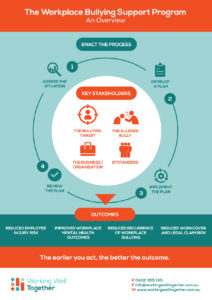Do you find you are spending the same or more time supporting those who have unsubstantiated or disproved bullying claims as those who have been substantiated?
If you have, you are not alone. In my specialist support role, employers have asked me to work one on one with bullying claimants in a case management and support capacity. Some of those cases are clearly bullying; some of them aren’t.
However, I have found that there are often complex underlying individual issues, which helps to understand why the claim has been made. Unless these are addressed, either at a company or individual level, there will be limited chances of a successful resolution. This can itself lead to costly on-going resource intensive management on your managers and, usually HR, employees.
What are circumstances that lead to a unproven or unsubstantiated bullying claimant needing support?
There are a number of employees who have been seriously bullied in the workplace. However, they are not the only employees who need a workplace support in circumstances of bullying claims.
Below are three of the scenarios relating to unproven or unsubstantiated bullying claims I have found leading to a need for employee support.
Not all claims can be proven to be bullying. Some individuals who use bullying type behaviours do so covertly, behind closed doors. One employee I worked with, the employer asvised that the scenario had been externally investigated with the majority of incidents being unsubstantiated. They stated that while they had not been substantiated, this didn’t mean that they didn’t happen. To them, the impact of the behaviour on that employee was obvious and significant. This was a key motivator in the company implementing support for that employee, to ensure they maximised the opportunity to keep him safe and also help him return to health.
A history of being targeted in previous employment is also a reason that an employee may require support. Employees who have been bullied in the past may unconsciously bring their experience to future workplaces. This can influence how an employee experiences their new workplace. For example, an employee I worked with struggled with the way the company was managing change. The employee viewed decisions made as a personal attack and reflection on herself and her abilities. While change in the company wasn’t managed perfectly, the employee developed the perception of being bullied because of her previous experience and it’s impact on her.
A history of trauma and other mental health injury outside of the current workplace may also impact on an employees perceptions of being bullied or not. Employees in this group can be incredibly complicated and challenging for companies who are not skilled or resourced to work with such individual complexity. One employee I worked with in this situation was influenced by the employee’s traumatic past. Management responses, whether reasonable or unreasonable, were interpreted as part of the bullying perception.
Often these employees will remain in the workplace and the support that they need will vary. Some can be supported through specific skill development. Others require help identifying strategies specific to them and articulate those to their employer which help keep them safe and well. Others, particularly in that third scenario, require sensitive, trauma informed, active encouragement to engage in externally qualified professional support to assist in their recovery.
Active encouragement and facilitation to engage in support
I mentioned above the need to actively encourage the engagement of support. This can be the case with all three scenarios.
In situations where there is a level of trauma and significant anxiety, human brain functioning shuts down, reverting to basic responses. Those responses are fear based with a need for safety as a central focus. Traumatised individuals will often re-experience that trauma and may be reliving that event as they are sitting talking to you talking about what has occurred.
This is a key reason why I suggest employers to actively encourage and facilitate the engagement of support. An individual may not be able to see their own needs because of that brain shutdown. This is not to say you can force an employee to support, that’s not possible. However, you can give them every opportunity to successful engage in support.
Workplace bullying claims, proven, unproven and unsubstantiated, are rarely simple and often multilayered. This is why they are time consuming. Engaging claimants in the right support will help in managing the risk and ensuring your employee remains safe or working with them to bring them back to health. At the very least, you know you have done everything possible to achieve this goal.
Learn more about our Workplace Bullying Support Program
Contact us today for a confidential discussion on how we can help you support you and your employees with bullying claims.


